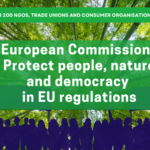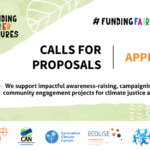Europe is once again hit by heat waves. Impacts of the climate crisis are threatening lives, livelihoods, jobs and fundamental rights of many Europeans. The EU must urgently and drastically increase its 2030 climate target and direct all EU funds towards a just transition to climate neutrality to protect its citizens.
After the warmest year in 2019 with two extreme heat waves, Europe is once again racked by severe droughts, water scarcity and extreme temperatures happening due to the climate crisis. According to the most recent data published by Copernicus, Europe has warmed faster than any other continent in recent decades and current temperature is almost 2°C above that for the latter half of the 19th century. Unprecedented Arctic fires and record temperatures in Siberia, proven to be “almost impossible without the influence of human-caused climate change”, gives an indication of the severity of future climate impacts in Europe if climate action is not accelerated.
These impacts hitting Europe right on top of the COVID-19 outbreak is deepening social and economical inequalities. As a recent study outlined, only robust,comprehensive and concerted political actions can limit the devastating effects of the climate crisis while creating more resilient communities. To do so, the EU must urgently increase its 2030 emissions reduction target from 40% to at least 65% and use EU funds for speeding up the transition to a just and climate neutral economy.
Regarding the prevention of climate change impacts in Europe, Former IPCC Vice Chair, Jean–Pascal van Ypersele (UCLouvain university) said: “After the devastating COVID-19 crisis, we now know that the radical changes presented yesterday as unimaginable are possible when we really feel the danger that threatens us, and when the political will is there.
We need to apply these lessons learnt to the climate emergency as time is running out to be on track to global net zero emissions by 2050. All Member States must use the huge potential of recovery measures and funds to step up their climate ambition and develop stronger policies.”
Director of Climate Action Network (CAN) Europe, Wendel Trio said: “ All crisis threatening people’s lives must be treated with great emergency. Since the day that EU leaders signed the Paris Agreement, they know that it is crucial to step up climate action as the current level of 2030 climate target is not enough to tackle the climate crisis. This year must be the year when EU leaders agree to increase the 2030 climate target to at least 65%. It is the only way for EU leaders to prove that they are committed to protect the most vulnerable from all kinds of current and future disruptions.”
Alfredo Sendim, Portuguese farmer who took the EU to Court for its failure to protect citizens’ fundamental rights from the climate crisis said: “As organic farmers in the South of Portugal, we did what we can do to adapt to the changing climate. However, we reached a point that our efforts are no longer enough. It is time for EU leaders to protect us by increasing immediate term climate action and developing all relevant policies and measures.”
ENDS
Contact:
Goksen Sahin, Communications Coordinator, goksen@caneurope.org, +32 468 45 39 20
Climate Action Network (CAN) Europe is Europe’s leading NGO coalition fighting dangerous climate change. With over 170 member organisations from 38 European countries, representing over 1.500 NGOs and more than 47 million citizens, CAN Europe promotes sustainable climate, energy and development policies throughout Europe.



